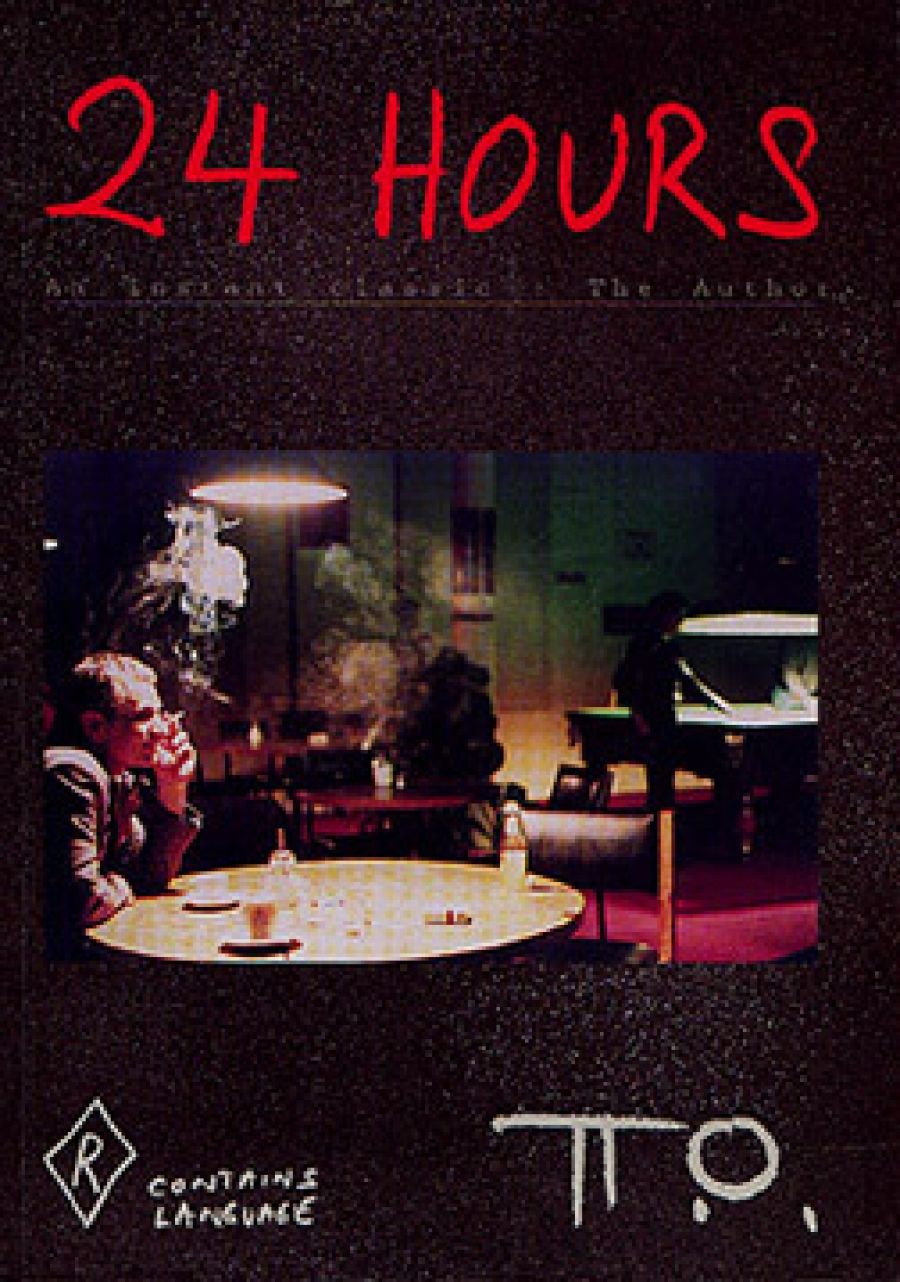
- Free Article: No
- Contents Category: Poetry
- Review Article: Yes
- Online Only: No
- Custom Highlight Text:
This is not another ‘slim volume’ of poetry; no way would it fit in a coat pocket. Ten years in the writing, weighing in at 740 pages, it is a brick of a book – well-bound paperback, heavy covers, designed to last. The poet had full say over not only the content, but the design, typesetting and production, resulting in a book unlike any produced under the nervous economic dictates of mainstream publishers. Six turned this manuscript down. Unsurprised, p.O. published it himself.
- Book 1 Title: 24 Hours
- Book 1 Biblio: Collective Effort Press, $45 pb, 740 pp
24 Hours opens on a bridge in an anonymous city. Very soon we know we’re in Melbourne, and by the third page we’re definitely in Fitzroy. Thus begins a journey through a long moment of the city’s history, a detailed social and linguistic timecapsule situated in the 1980s, in the Greek cafés of a vanishing Fitzroy. Customers play cards and drink coffee, around the clock, betting, winning, losing. Against a background racket of pinball machines and juke box we hear the voices of Balcha, Charmaine, Darko, 10% and a parade of mainly migrant characters – gamblers, family men, strippers, drug addicts, crazies, kids from the housing commission flats. I’ll say that again. We hear the voices:
Balcha (shuffling a deck
of cards around) launches into a story,
Eye woz Sai’Vinsens,
for this ......... hee-a ( sum-
thing) neva mayn, en
tha Ketholik-Pris hee pus evri-dai.
But hee
n-o STOP (bikoz ey’m n-o
Ke’ tholik).
Wun dai eye get wum ‘Bombon’y
Erri’, but ...
eye kun ‘it’ (bikoz
iz awl ‘drips’, en .... thingz).
Eye kol him: ‘Faatha!’ ‘Faatha!’
Eye get wun ‘Bomb-on-y-erri’, but
kun ‘it’,
en ... hee ‘Bless’ mi!
En ffrom DET taym ... eye NEVA
bek a Winna!, he sez.
Hee ‘KHURS’ mi!
This book is a tour de force of aural writing, bridging the gap between the written and spoken word more effectively than any other writing I’ve seen, poetry or prose. By transcribing direct speech phonetically, p.O. virtually forces the reader to pronounce some words aloud in order to make sense of them. He succeeds in changing the way we read – slowing the process and locating it in the mouth and the ears, as well as the brain, making it a physical as well as intellectual event. The reader literally hears the accents of the speakers, and occasionally even ‘speaks’ Greek! On a profound level, p.O. has made Melbourne’s migrant voices real for non-migrant readers, and given those voices a permanent place in literature and history.
Those of us lucky enough to have heard p.O. read his work have a memory of his delivery. This helps us reconstruct the voices, but is not a precondition for enjoyment of the book. p.O.’s phonetics are startlingly accurate. I read a selection of the Greek language passages from 24 Hours to Greek-speaking friends, and they were quickly able to understand what I was saying, even though I had no idea! A specific group of readers who will get a kick out of this book are the (adult) children of Greek migrants. Although fluent in their parents language, many can’t ‘read’ Greek. Until this book.
I say ‘adult’ most advisedly here, as the poet doesn’t flinch from depicting the sordid. The world of 24 Hours is a male world. Violence, drugs and porn appear in the book as they are in life – common, real, not very pretty. The few women who appear are never free of their sex-object status.
An important dimension of the text is p.O.’s use of concrete poetry throughout – visual effect created by typescript, word placement and illustration, used to underscore meaning or add levels of interpretation, or to stand as a poem on its own. p.O.’s handling of the genre is playful, witty and effective.
‘Come on, Darling’, she sez
and he unzips his fly ++++++!
Structurally, 24 Hours is a series of vignettes linked by shared location and characters. A more definite overall narrative shape would perhaps have provided more momentum. As it stands, 24 Hours is a slow, albeit fascinating, read of notable length.
p.O.’s refusal to be tied down by grammatical and spelling conventions is long-standing. On the last page the statement Fuck the spelling echoes the defiance of everyone (and that’s Poetry) who was ever frustrated by the tyranny of written ‘correctness’, (and by extension, all ‘correctness’). p.O.’s ability to communicate has triumphed over these constraints with such force as to blow away literary boundaries and open paths to new forms of poetry.
24 Hours claims a place on the Australian ‘poetry novel’ shelf alongside Dorothy Porter’s work and Alan Wearne’s, but might sit more comfortably next to James Joyce’s Ulysses, sharing with Ulysses a linguistic experimentalism. At a cover price of $45, 24 Hours is probably out of the price range of the casual browser. However, p.O.’s well-established reputation as a poet continues to grow, and the book is already a collectors’ item. Libraries and linguistic departments would be wise to snap it up now. It may not be ‘an instant classic’ as claimed on the cover, but it is certainly a milestone in Australian and international literature and deserves to be recognised as such, if not instantly, then soon.


Comments powered by CComment